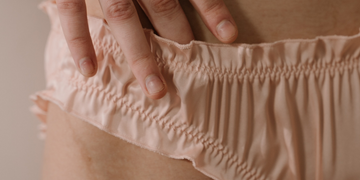Does the changing of seasons affect your vagina?

Over the course of a year, a lot of changes can happen in your body. There can also be a lot of changes within your vagina over the same time period — particularly as it has to do with different seasons, and the behaviors, clothes, or climate that is common during that time of year. Let’s break it down between Winter, Summer, and Fall, assess whether ‘winter vagina’ is real, learn why stories of summer yeast infections persist year after year, and find out whether increased candy intake around Halloween can cause yeast infections.
Winter
A UK newspaper published an article recently stating that ‘winter vaginas’ are something that women should be concerned about. One of their sources, a midwife, stated that vaginas can dry out during the cold weather, much like your face or lips do. The good news is that this is not true. Your vagina is lined with a mucous membrane that keeps it wet year round. Cold weather does not affect mucus production, meaning your vagina should not become dryer during the winter compared to any other time of year. Winter is a time for many people where they are more likely to get sick, so as it relates to both vaginal health & overall body health, pay attention to your body, try to eat properly and rest sufficiently, and when possible, boost your immune system with vitamins C & D.
One thing that winter shares with summer is the commonality of yeast infections. Yeast infections are caused by an overgrowth of candida bacteria in the vagina and vulva. This causes a painful, itchy, and red feeling in that area; a feeling you may know all too well. Candida flourishes in warm, moist environments (like bathing suits), but also in items like tights, jeans, or other synthetic fabrics that may be more common during the winter. To avoid yeast infections (year round, but particularly when it’s cold out), try as much as possible to wear loose clothing made of breathable fabrics.
Summer
As mentioned above, tight, wet (moist) clothes are a culprit for yeast infections, meaning that the summer months are a particularly notable time when it comes to the risk of yeast infections. One thing that has been debunked, is whether rises in humidity or changes in heat contribute to changes in vaginal pH levels. The vagina will not necessarily have an altered pH level because of these changes in temperature or weather, but the fabric and tightness of your clothing will certainly play a role in whether the bacteria can flourish.
Fall
Moving into autumn, as the weather gets drier and the leaves start to change, one might worry about a modified ‘winter vagina’ or a dryness that comes with the season change. Much like in winter, the vaginal mucus will not change, but the vulva may find itself less hot and sweaty than it was in the summer months — meaning more overall comfort in the entire area. The skin on the mons pubis could get drier during drier months, in which case you should speak to a medical professional about how best to treat dry skin in that area.
For many years there has been a rumor that eating more candy (like you may do as it gets closer to Halloween), may cause yeast infections. Diets high in sugar and refined carbohydrates have long been blamed for resulting in yeast infections, but there is not enough known by scientists to prove whether this is true. Yeast infections are more likely due to antibiotic use, increased estrogen levels (for those who are pregnant or taking high-dose estrogen birth control pills), or those with uncontrolled diabetes or an impaired immune system.
As with many issues to do with vaginal health, prevention comes down to listening to and taking care of your body, and watching for warning signs early. As it gets colder over the course of autumn, be careful about extremely tight fitting leggings or tights, spending too much time in hot tubs, or unnecessary antibiotic use for colds or viral infections. These can all increase your risk for yeast infections- an itchy, unpleasant experience we’d all rather avoid.
Keep Reading

Why do I get yeast infections around my period?
November 18, 2022

Yeast infection myths
Aug 13

Discharge: is it normal?
Aug 23








